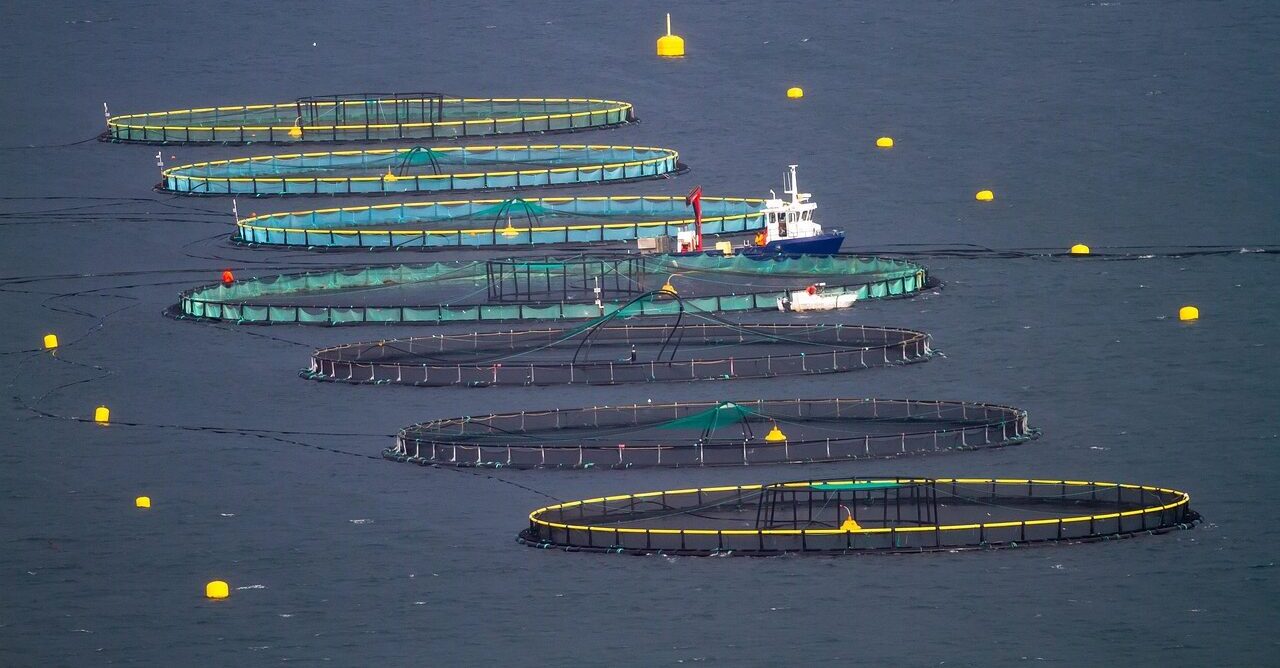For Immediate Release: September 2, 2025
Contact:
Feini Yin, Communications Director, North American Marine Alliance, feini@namanet.org
Hamida Kinge, Content Strategist, North American Marine Alliance, hamida@namanet.org
WASHINGTON — Don’t Cage Our Oceans and a broad coalition of stakeholders strongly oppose the Marine Aquaculture Research for America (MARA) Act. Introduced by Sen. Roger Wicker (R-MS) and Sen. Brian Schatz (D-HI), this new bill would accelerate development of industrial-scale, carnivorous finfish farms in the open ocean while framing it as “assessing the viability” of offshore aquaculture via commercial-scale “demonstration projects.” Currently, these operations do not exist in U.S. federal waters and Congress has not explicitly approved a process for allowing them. If the MARA Act passes, it will pave the way for an unprecedented experiment in our oceans.
The MARA Act would hand the reins of the offshore aquaculture permit process to the National Marine Fisheries Service’s Office of Aquaculture, turning it into a one-stop approval shop for mega-scale factory fish farms. Under the banner of “research,” this bill is attempting to fast-track industrial-scale aquaculture in our public ocean spaces without public buy-in, meaningful oversight, or consideration of the many small businesses and communities that stand to be harmed if offshore aquaculture gains ground. The bill also mandates spending millions in taxpayer dollars on a PR campaign to clean up industrial aquaculture’s bad reputation and manufacture public consent.
Industrial offshore aquaculture is the oceanic equivalent of land-based concentrated animal feeding operation (CAFO) farms. These expansive operations pose serious risks to wild fisheries, food quality, coastal communities, and local and regional food systems, all while tightening corporate control over the domestic and global seafood supply chain. Offshore finfish aquaculture operations typically house about eight to 10 vast enclosures that, when combined, are equal or greater in size to a football stadium. Open-ocean fish farming discharges tons of waste, spreads viruses and disease, and threatens wild fish populations through frequent mass escapes, competition for habitat and food, and genetic alterations. On top of that, the feed ratio can be as high as 5:1, meaning it can take up to five pounds of wild fish to produce just one pound of farmed fish, making it a highly extractive and unsustainable system.
Statements from Stakeholders Around the Country:
Florida: “Calling the MARA Act ‘research’ puts the cart before the horse. Instead of examining the existing body of science that already documents the damage that industrial-scale finfish farms cause, the bill would launch risky, commercial-scale experiments in the ocean and call it ‘science.’ By the time MARA’s proposed 10 years of ‘research’ are up, the harm will already be done. We can’t afford that in the Gulf, or anywhere else for that matter.” — Casey Streeter, commercial fisherman, seafood market owner, and founder of Florida Commercial Watermen’s Conservation
Florida: “The Gulf Coast is already suffering so many assaults, including nutrient pollution that can contribute to the incidence of red tide and other harmful algal blooms. Industrial fish farms will only add to the nutrient pollution from fish waste and feed, and put pressure on stocks of Gulf forage fish like menhaden that are harvested and made into fish meal. This legislation continues to ignore voices from the Gulf Coast, which have been strong in opposition to fish farms, including the Ocean Era project off Florida that was permitted by the federal government despite that opposition.” — Christian Wagley, coastal organizer, Healthy Gulf
Maine: “I want to express my strong disapproval of the MARA Act. I believe that aquaculture should be carefully planned by the states and supported with new and substantial federal funding. This growing aquaculture industry must be designed to benefit small communities along the coastline, focusing on local planning that truly serves the people, not just a few wealthy corporations. Our support should be directed toward small and medium-sized businesses that foster healthy communities and build wealth among many, rather than concentrating it in a corporate executive hierarchy.” — Keith Butterfield, oyster farmer and founder/owner of Butterfield Shellfish
Massachusetts: “Supporters of the MARA Act keep saying the U.S. exports too much of its wild catch — and they’re right! Around 70 to 90 percent of the seafood we eat is imported, even though we land enough to feed the country. But the answer isn’t building giant offshore fish farms. We have to fix our broken seafood system, which ships wild fish overseas while flooding our markets with cheap, low-quality, farmed imports. Fishermen have been feeding people from the sea for generations, and we still have the wild fish to keep doing it, especially if folks start eating a wider variety. We don’t need more experiments in the ocean. We’ve got the wild fish, and we’ve got the people who know how to catch it.” — Doug Feeney, independent fisherman, fisheries advocate, and co-founder of the Chatham Harvesters Cooperative
New York: “The MARA act is the classic wolf in sheep’s clothing bill. We’ve seen it before, and we’ve seen the results of Big Aquaculture in British Columbia with farmed salmon. The last thing we need from our lawmakers is a method by which to turn our federal waters into a petri dish for Big Aquaculture, polluting the ocean with fecal sludge and antibiotics while putting US commercial fishermen out of business. US commercial fishermen harvest wild-caught US sustainable species for the American dinner table. Thanks, but no thanks, MARA, we need to keep it wild!” — Bonnie Brady, executive director, Long Island Commercial Fishing Association
Alaska: “The MARA Act is the AQUAA Act in Trojan horse form, allowing NOAA to permit commercial-scale finfish farms in the name of ‘research.’ Communities and small-boat fishing operations are watching federal agencies betray their livelihoods in order to prop up their corporate competitors and create even more consolidation in the seafood system. Generations of fishermen have invested blood, sweat, and capital into their operations and now some members of Congress are essentially turning their backs on the people who feed our country, one community at a time. In contrast, the Keep Finfish Free Act, which I fully support, hits pause on offshore aquaculture until lawmakers can truly respond to the grave risks and economic disruption that fish farms will bring to our coastal communities.” — Melanie Brown, 4th generation Bristol Bay salmon fisher
Louisiana: “MARA would open our waters to industrial fish farms, pilot projects that threaten local fishers, displace wild harvest, and flood the market with bland, questionable fish. These operations don’t exist here yet, but this bill would change that. Once they’re in, there’s no going back. We owe it to our fishers, to our coastal communities to say no before it’s too late.” — Chef Dana Honn, co-owner of Nikkei Izakaya and founder of the Louisiana Shrimp Festival and Shrimp Aid
Georgia: “As a chef, it’s important for me to be discerning about where my seafood comes from. I proudly serve farmed oysters and catfish from small, community-based aquaculture producers that I trust. But the high-volume, ocean-feedlot style finfish farms promoted in the MARA Act are an entirely different beast. At the scale being proposed, and in our federal waters, they’d be devastating to our oceans, our multi-generational fishing communities, the unique culinary heritage of the South, and the quality and variety of seafood available to consumers.” — Cassandra Loftlin, chef, sustainable food systems advocate, and owner of Goodness Gracious Grocery
National: “The MARA Act is hiding behind a benign term like ‘research’ to disguise the fact the bill does not intend to put forth objective research. Its real aim is to fast-track permits for dirty, mega-sized floating fish farms in U.S. ocean waters — with taxpayer dollars picking up the tab. This bill is déjà vu; it’s essentially the failed AQUAA Act rebranded. It puts a federal government agency in the business of promoting (and advertising for!) a controversial industry that directly thwarts the agency’s existing directive to conserve and manage our wild fisheries.” — James Mitchell, legislative director, Don’t Cage Our Oceans
National: “The MARA Act is a carbon copy of the worst aspects of industrial land farming. As someone who’s worked across land and seafood systems for years, I can tell you that the same big agribusinesses bleeding family farmers dry are the ones leading lobbying efforts to replicate this madness on our ocean. And that’s no coincidence since they stand to profit. This greed-driven model of food production will lead us to ecosystem collapse and push our community-rooted food producers to the brink. It’s a false solution to a broken system and treats our ocean like a toilet instead of the shared public resource it is. If we want real food sovereignty, we must invest in real fishing and farming families who’ve been faithfully feeding us for millennia, not corporations trying to turn our oceans into shares on Wall Street.” — Niaz Dorry, executive director of North American Marine Alliance and the National Family Farm Coalition
Header image: LTapsaH via Pixabay

